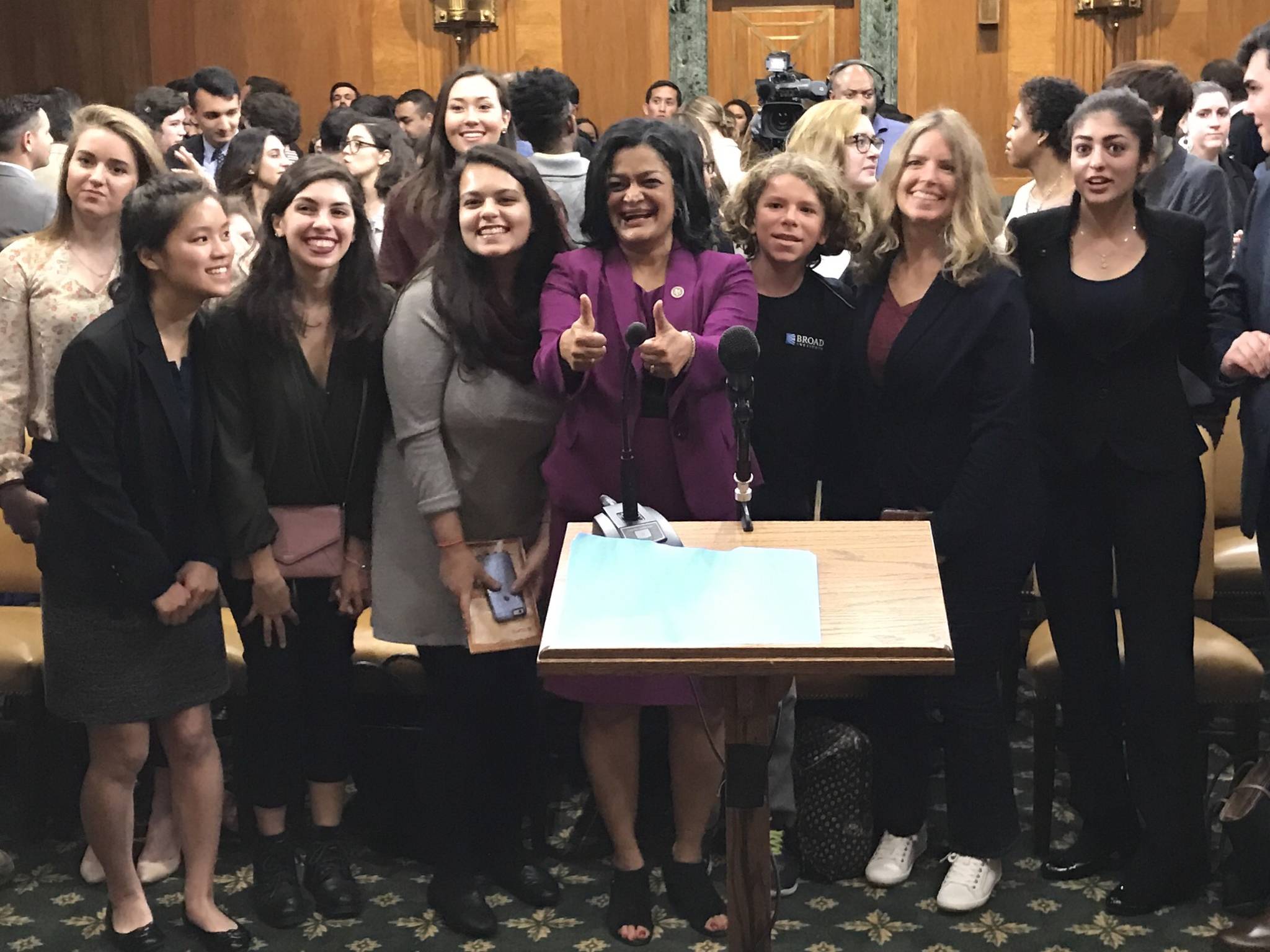In 2016, Sen. Bernie Sanders made free college tuition a central tenet of his presidential campaign — an idea so wildly popular, particularly among students and professionals saddled with some of the nation’s $1.3 trillion in student loan debt, that the Democratic Party establishment took up the charge, too. Hillary Clinton first pitched it last summer. Since then, not much has happened. Or rather, the opposite has happened: President Donald Trump’s proposed budget slashes funding for the U.S. Department of Education by $9.2 billion and cuts several programs designed to help low-income students go to college.
But this fight is far from over.
On Monday afternoon, U.S. Rep. Pramila Jayapal and Sanders, flanked by other Democratic Congresspeople including Sen. Elizabeth Warren and Rep. Keith Ellison, announced the College for All Act. It would, if passed, make all public colleges and universities in the country tuition-free for any students from families earning up to $125,000 a year — thanks to a federal-state partnership that would require the feds to put up two dollars for every state dollar, Jayapal said in an interview with Seattle Weekly. That’s about 80 percent of the U.S. population, she said. It would also make all community colleges tuition-free regardless of student or family income, triple the amount of federal funding currently available for work-study programs, and cut student-debt interest rates in half.
As with Sanders, it’s an idea that Jayapal said has long been at the top of her legislative priority list.
“We believe that it is not normal, the situation we’re in,” Jayapal said, referring in part to the fact that it is increasingly difficult to find a living-wage job with just a high school diploma. But then, when people do go to college, they’re often stuck with loan payments for decades. What Jayapal and Sanders say the bill will do is take the country back to a time when public universities were basically free — a time when the U.S. graduated more people from higher educational institutions than any other country in the world.
“This is not a radical idea,” Sanders said during Monday’s press conference in Washington, D.C. “In 1965, the average tuition at a four-year public university was just $256 dollars. … If they could do it in the 60s, we can do it now.”
Though some might (understandably?) argue that such a thing will never pass in today’s GOP-controlled Congress, Jayapal insists that higher education is not a partisan issue. “If you’re in business, you know you need more skilled workers. You know you need to invest in that workforce,” she said. Investing in education “will pay us back.” She pointed to her time in the Washington state senate, when a bipartisan group of legislators agreed to cut the state’s four-year college tuition costs by 15 to 20 percent. And states across the country are making moves like this, including the predominately Republican state of Tennessee, which, after making community college free for recent high school graduates, is now pushing for free community college for all adults.
Jayapal and Sanders have proposed funding the College for All Act with a tax on Wall Street speculation (a.k.a. risky short-term bets), something Sanders proposed early last year. “That’s what we would advocate using to pay for it,” Jayapal said. “But frankly, the real question is: Do you believe this is an important investment? The Republicans have come up with plenty of money [for other things such as] a trillion dollars in tax breaks for the wealthiest four percent. I believe we should be spending those dollars on investing in our young people, in our future.” And, she said, “I think there really is a lot of potential for it to pass.”
If the people help out, that is. Both Sanders and Jayapal encouraged their constituents to host rallies at college campuses across the country, to call their representatives, to organize. “You, and millions of other young people, have enormous power,” Sanders told the room in D.C., which was filled with members of the United States Student Association.
“We’re going to have to create the political faith and the political will to demand that we take on this crisis,” Jayapal said. “This is a crisis that doesn’t just affect Democrats. It doesn’t just affect feel-good liberals. This kind of debt is a drain on our economy.” Some workforce reports in Washington state, for instance, suggest that there is a significant gap between the number of skilled jobs available and the number of people qualified to fill them. “People can put aside their partisan politics. This is something that can affect everybody.”
sbernard@seattleweekly.com








